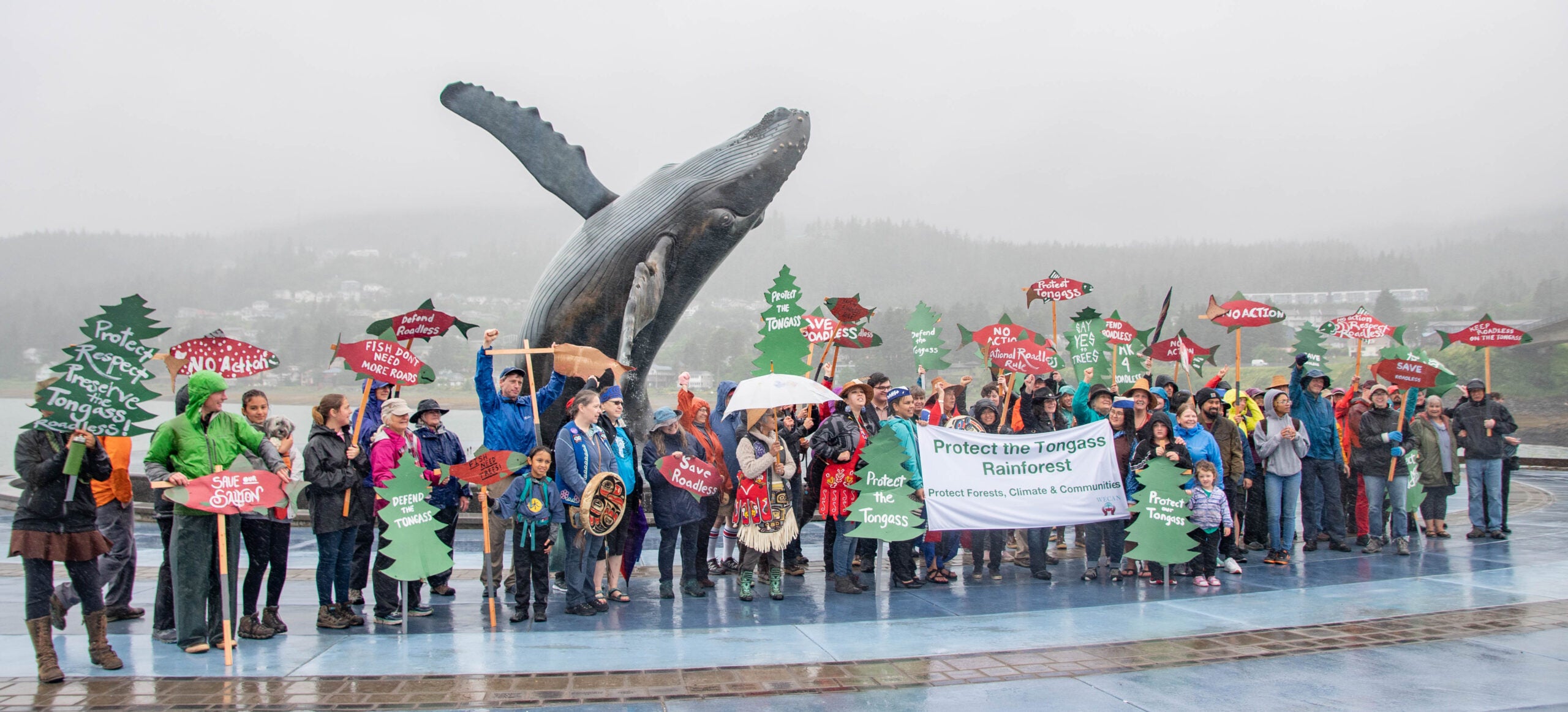Southeast Alaskans Rally to Defend the Tongass and the Roadless Rule
Local leaders, Alaska Native people, and community members gathered to double down on support for the existing Roadless Rule in the Tongass National Forest
Contact
On June 22, Southeast Alaskans took to the streets at the Alaska State Capitol, rallying with hand-painted salmon and tree signs to show their support for keeping the 2001 National Roadless Rule on the Tongass National Forest. The Tongass National Forest falls within the traditional territories of the Tlingit, Haida and Tsimshian Peoples, the original inhabitants of this land since time immemorial. The State of Alaska is seeking a state-specific Roadless Rule that could unravel or eliminate critical ecological and cultural protections provided under the existing 2001 National Roadless Rule, by opening up Tongass roadless areas to new logging roads and old-growth clearcutting. Additionally, the national forest is the largest intact temperate rainforest in North America and serves as a “carbon life-raft” by storing carbon and maintaining America’s resilience in the face of the climate crisis.
The existing rule protects roughly 9.2 million roadless acres from additional logging and new logging roads in Alaska’s Tongass National Forest. The rally was held ahead of the public release of the Draft Environmental Impact Statement (DEIS) for the Alaska-specific Roadless Rule, which is expected sometime this summer. The rally makes clear that Southeast Alaskans support keeping the current National Roadless Rule and are urging the Secretary of the United States Department of Agriculture, Sonny Perdue, to select a “no-action” alternative for the Alaska-specific rule.
Community members were joined by Alaska State Representative Sara Hannan (D-33), who spoke about the importance of preserving the Tongass and participating in the upcoming public comment period this summer regarding the rolling back of the roadless rule. The rollback could harm the regional economy and industries important to Southeast Alaska — tourism, recreation, and fishing. Attendees were invited to fill out public comment cards, that will be submitted once the public comment period opens.
Members of the Alaska Native community, including Organized Village of Kake Tribal President Joel Jackson, shared concerns about the potential negative impacts an Alaska-specific rule could have on their communities’ cultural and traditional practices, including hunting and fishing activities.
Attendees then marched to a local waterfront park, stopping first at the Governor’s Mansion for a group photo, to ensure Alaska state elected officials know that Southeast Alaskans support keeping the National Roadless Rule on the Tongass. The march made it clear that it is within both Alaskan and national interests and values to ensure the National Roadless Rule protections remain on the Tongass.
Joel Jackson, Tribal President, Organized Village of Kake, said: “We as tribal leaders support keeping the national roadless rule, which helps protect resources in our area from any more logging roads and logging. We depend on our forests and salmon streams to sustain us. Our traditional hunting and fishing practices are critical because they put food on our tables.”
Wanda Culp, Tongass Delegation Coordinator, Women’s Earth and Climate Action Network Tongass Delegation, said: “We are the voices for the protection of the 2001 Roadless Rule. It must be coded into law for its own protection from industrial exploitation.”
Meredith Trainor, Executive Director, Southeast Alaska Conservation Council, said: The people of Southeast Alaska sent a loud and clear message to DC today by calling on Secretary Perdue to select the “no-action” alternative and keep the National Roadless Rule in place on the Tongass. The State of Alaska and the Alaska delegation like to say that Southeast Alaskans want to see a return to old-growth clearcut logging on the Tongass – these strong, local voices say otherwise. Why does our delegation keep pushing a return to old-growth logging when we know our economy is powered by fishing, tourism, and recreation? You could say we’re “stumped.” We urge Secretary Perdue to listen and respond to the voices of the Southeast Alaskans we heard from today, by keeping the National Roadless Rule on the Tongass.
Osprey Orielle Lake, Executive Director, Women’s Earth and Climate Action Network, said:The world’s largest remaining intact temperate rainforest containing vital old-growth trees is under attack because of government efforts to undo the Roadless Rule. The Tongass Rainforest of Alaska — the traditional homelands of the Tlingit, Haida and Tsimshian Peoples — has been called ’the nation’s climate forest’ due to its unsurpassed ability to sequester carbon and mitigate climate impacts. For decades, industrial-scale logging has been destroying this precious ecosystem and disrupting the life-ways of the region’s Indigenous peoples and local communities. WECAN stands with Indigenous peoples, Southeast Alaskans and allies nationally and internationally to say no to further old-growth logging, and yes to maintaining the current Roadless Rule. Our national forests are essential lungs of the Earth.
Eric Jorgensen, Managing Attorney of Earthjustice’s Alaska regional office, said: “Weakening Roadless Rule protections to open more old growth to logging is just another damaging and short-sighted Trump rollback. The Tongass is relied on by local communities, Alaska Native people, recreational users, and tourism and salmon fishing businesses. Additionally, the Tongass has national significance as it is a buffer against global climate change. We applaud the efforts of all who are stepping forward to defend the Tongass. We at Earthjustice will continue to do everything in our power to ensure that these critical Tongass lands are protected for generations to come.”

Additional Resources
About Earthjustice
Earthjustice is the premier nonprofit environmental law organization. We wield the power of law and the strength of partnership to protect people's health, to preserve magnificent places and wildlife, to advance clean energy, and to combat climate change. We are here because the earth needs a good lawyer.